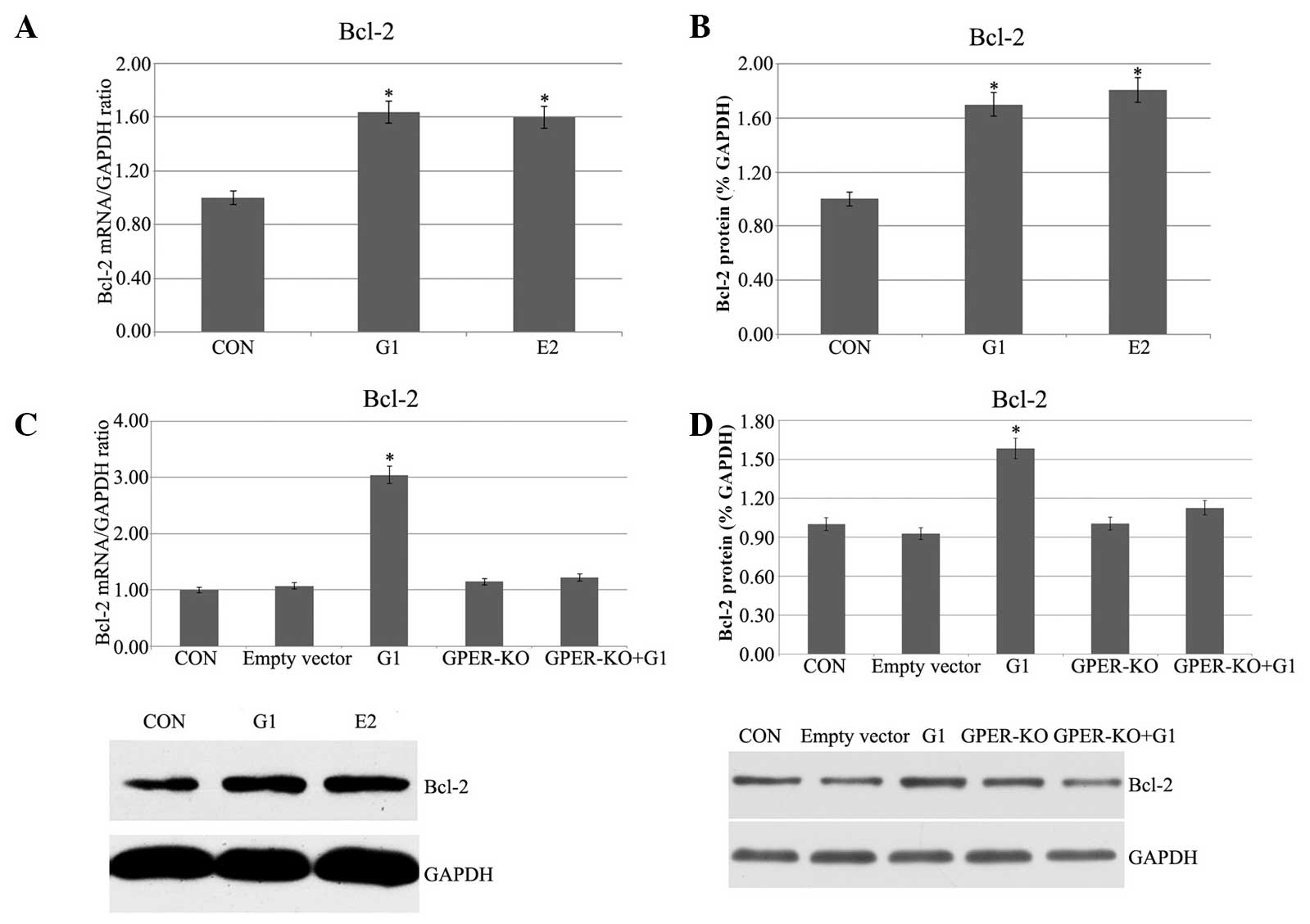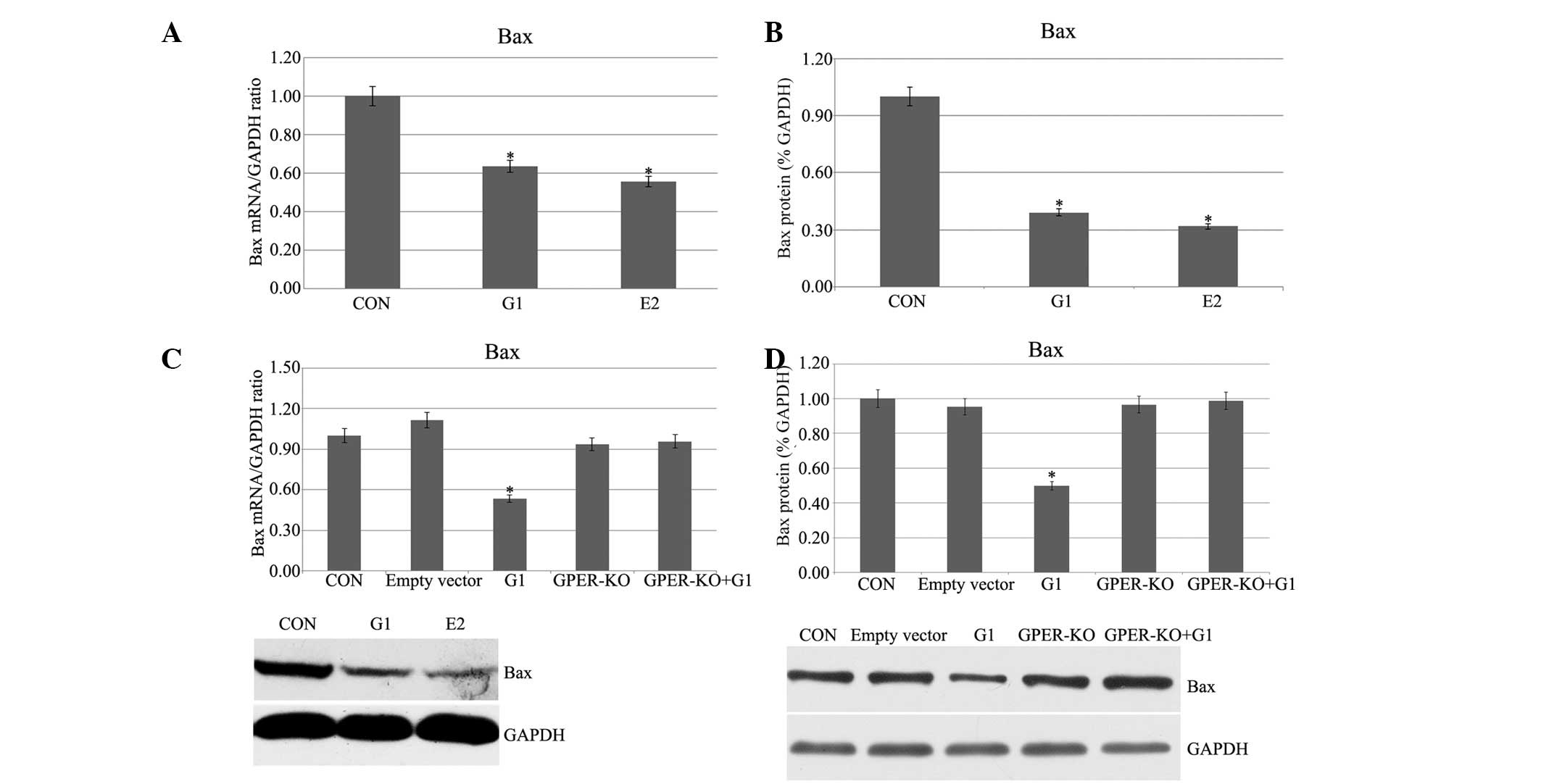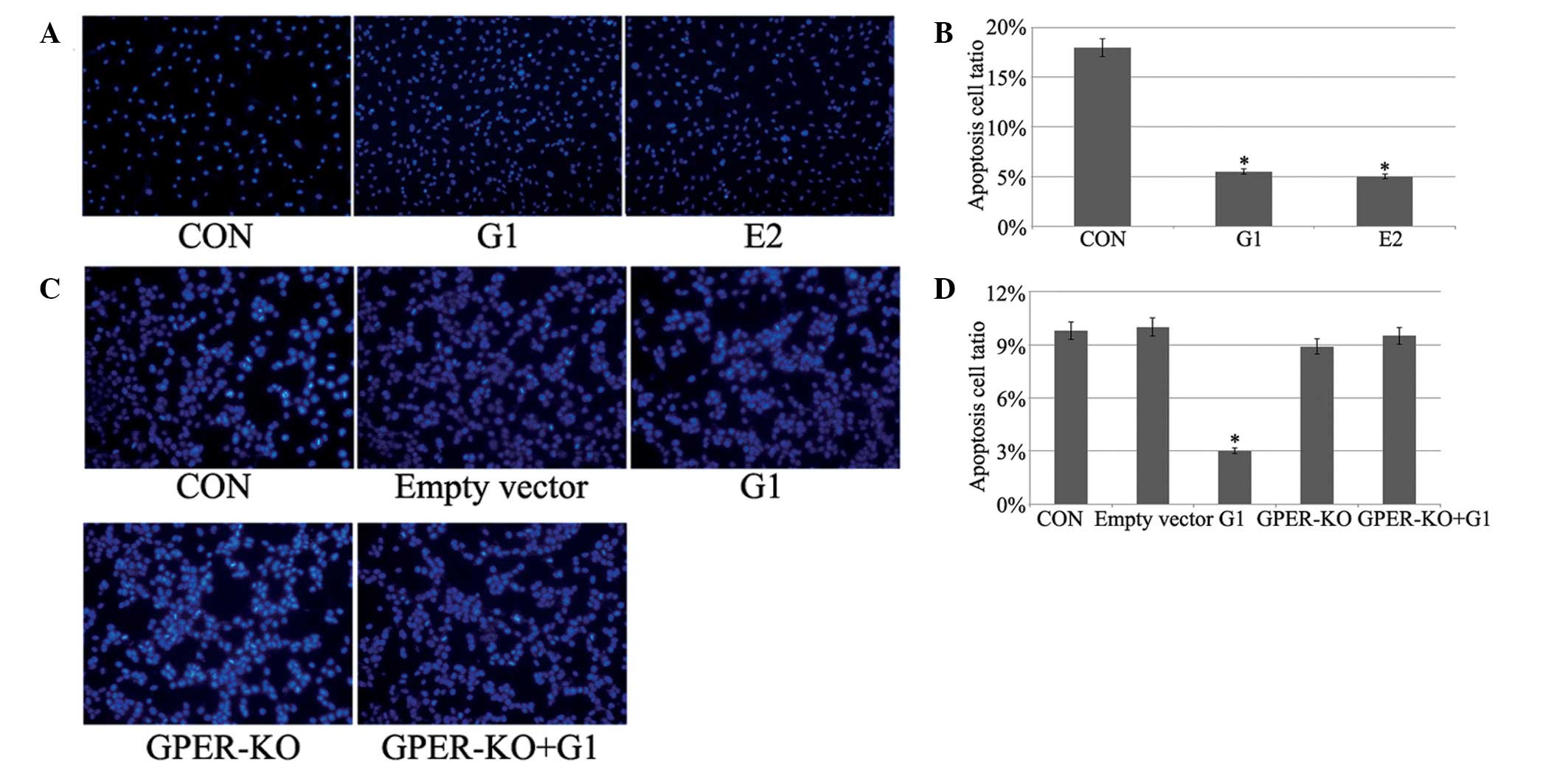|
1
|
Murphy E and Steenbergen C:
Cardioprotection in females: a role for nitric oxide and altered
gene expression. Heart Fail Rev. 12:293–300. 2007. View Article : Google Scholar : PubMed/NCBI
|
|
2
|
Grohé C, Kahlert S, Löbbert K, et al:
Cardiac myocytes and fibroblasts contain functional estrogen
receptors. FEBS Lett. 416:107–112. 1997. View Article : Google Scholar : PubMed/NCBI
|
|
3
|
Lizotte E, Grandy SA, Tremblay A, Allen BG
and Fiset C: Expression, distribution and regulation of sex steroid
hormone receptors in mouse heart. Cell Physiol Biochem. 23:75–86.
2009. View Article : Google Scholar : PubMed/NCBI
|
|
4
|
Deschamps AM and Murphy E: Activation of a
novel estrogen receptor, GPER, is cardioprotective in male and
female rats. Am J Physiol Heart Circ Physiol. 297:H1806–H1813.
2009. View Article : Google Scholar : PubMed/NCBI
|
|
5
|
Bopassa JC, Eghbali M, Toro L and Stefani
E: A novel estrogen receptor GPER inhibits mitochondria
permeability transition pore opening and protects the heart against
ischemia-reperfusion injury. Am J Physiol. 98:H16–H23. 2010.
|
|
6
|
Albanito L, Madeo A, Lappano R, et al: G
protein-coupled receptor 30 (GPR30) mediates gene expression
changes and growth response to 17beta-estradiol and selective GPR30
ligand G-1 in ovarian cancer cells. Cancer Res. 67:1859–1866. 2007.
View Article : Google Scholar : PubMed/NCBI
|
|
7
|
Carmeci C, Thompson DA, Ring HZ, Francke U
and Weigel RJ: Identification of a gene (GPR30) with homology to
the G-protein-coupled receptor superfamily associated with estrogen
receptor expression in breast cancer. Genomics. 45:607–617. 1997.
View Article : Google Scholar
|
|
8
|
Otto C, Rohde-Schulz B, Schwarz G, et al:
G protein-coupled receptor 30 localizes to the endoplasmic
reticulum and is not activated by estradiol. Endocrinology.
149:4846–4856. 2008. View Article : Google Scholar : PubMed/NCBI
|
|
9
|
Shanmuganathan S, Hausenloy DJ, Duchen MR
and Yellon DM: Mitochondrial permeability transition pore as a
target for cardioprotection in the human heart. Am J Physiol Heart
Circ Physiol. 289:H237–H242. 2005. View Article : Google Scholar : PubMed/NCBI
|
|
10
|
Bopassa JC, Eghbali M, Toro L and Stefani
E: A novel estrogen receptor GPER inhibits mitochondria
permeability transition pore opening and protects the heart against
ischemia-reperfusion injury. Am J Physiol Heart Circ Physiol.
298:H16–H23. 2010. View Article : Google Scholar :
|
|
11
|
Yuan SM and Jing H: Insights into the
monomers and single drugs of Chinese herbal medicine on myocardial
preservation. Afr J Tradit Complement Altern Med. 8:104–127.
2011.
|
|
12
|
Hu BJ, Chen JG, Xu XH, Chen Yc and Zhu JZ:
Experimental study on the cardiomyocyte apoptosis in the early
myocardial ischemia. Chin J Forens Med. 17:349–351. 2001.
|
|
13
|
Deschamps AM and Murphy E: Activation of a
novel estrogen receptor, GPER, is cardioprotective in male and
female rats. Am J Physiol Heart Circ Physiol. 297:H1806–H1813.
2009. View Article : Google Scholar : PubMed/NCBI
|
|
14
|
Bologa CG, Revankar CM, Young SM, et al:
Virtual and biomolecular screening converge on a selective agonist
for GPR30. Nat Chem Biol. 2:207–212. 2006. View Article : Google Scholar : PubMed/NCBI
|
|
15
|
Revankar CM, Cimino DF, Sklar LA,
Arterburn JB and Prossnitz ER: A transmembrane intracellular
estrogen receptor mediates rapid cell signaling. Science.
307:1625–1630. 2005. View Article : Google Scholar : PubMed/NCBI
|
|
16
|
Filardo E, Quinn J, Pang Y, et al:
Activation of the novel estrogen receptor G protein-coupled
receptor 30 (GPR30) at the plasma membrane. Endocrinology.
148:3236–3245. 2007. View Article : Google Scholar : PubMed/NCBI
|
|
17
|
Matsuda K, Sakamoto H, Mori H, et al:
Expression and intracellular distribution of the G protein-coupled
receptor 30 in rat hippocampal formation. Neurosci Lett. 441:94–99.
2008. View Article : Google Scholar : PubMed/NCBI
|
|
18
|
Haas E, Bhattacharya I, Brailoiu E, et al:
Regulatory role of G protein-coupled estrogen receptor for vascular
function and obesity. Circ Res. 104:288–291. 2009. View Article : Google Scholar : PubMed/NCBI
|
|
19
|
Bopassa JC, Eghbali M, Toro L and Stefani
E: A novel estrogen receptor GPER inhibits mitochondria
permeability transition pore opening and protects the heart against
ischemia-reperfusion injury. Am J Physiol Heart Circ Physiol.
298:H16–H23. 2010. View Article : Google Scholar :
|
|
20
|
Yellon DM and Hausenloy DJ: Myocardial
reperfusion injury. N Engl J Med. 357:1121–1135. 2007. View Article : Google Scholar : PubMed/NCBI
|
|
21
|
Ishihara Y and Shimamoto N: Sulfaphenazole
attenuates myocardial cell apoptosis accompanied with cardiac
ischemia-reperfusion by suppressing the expression of BimEL and
Noxa. J Pharmacol Sci. 119:251–259. 2012. View Article : Google Scholar : PubMed/NCBI
|
|
22
|
Liesa M, Luptak I, Qin F, et al:
Mitochondrial transporter ATP binding cassette mitochondrial
erythroid is a novel gene required for cardiac recovery after
ischemia/reperfusion. Circulation. 124:806–813. 2011. View Article : Google Scholar : PubMed/NCBI
|
|
23
|
Hansson GK: Immune and inflammatory
mechanisms in the development of atherosclerosis. Br Heart J.
69(Suppl): S38–S41. 1993. View Article : Google Scholar : PubMed/NCBI
|
|
24
|
Herskowitz A, Choi S, Ansari AA and
Wesselingh S: Cytokine mRNA expression in postischemic/reperfusion
myocardium. Am J Pathol. 146:419–428. 1995.PubMed/NCBI
|
|
25
|
Feldman AM, Combes A, Wagner D, Kadakomi
T, Kubota T, et al: The role of tumor necrosis factor in the
pathophysiology of heart failure. J Am Coll Cardiol. 35:537–544.
2000. View Article : Google Scholar : PubMed/NCBI
|




















